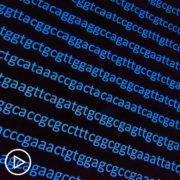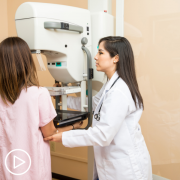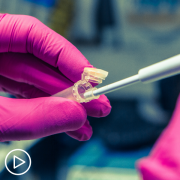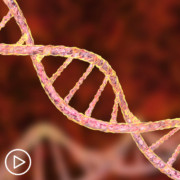What Does Breast Cancer Hormone Receptor Status Mean?
What Does Breast Cancer Hormone Receptor Status Mean? from Patient Empowerment Network on Vimeo.
There are many subclassifications of breast cancer—including a patient’s hormone receptor status. Expert Dr. Jame Abraham defines hormone receptor status and explains the potential impact on breast cancer treatment outcomes.
Dr. Jame Abraham is the chairman of the Department of Hematology & Medical Oncology at Cleveland Clinic and professor of medicine at Cleveland Clinic Lerner College of Medicine. Learn more about Dr. Abraham.
See More From INSIST! Breast Cancer
Related Resources:
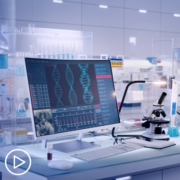
How Do Genomic Testing Results Impact Breast Cancer Treatment Options? |
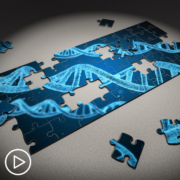
|
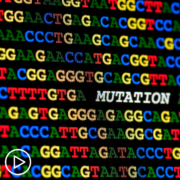
|
Transcript:
Katherine:
Dr. Abraham, can you please explain hormone receptor status?
Dr. Abraham:
Yeah. So, as you know, really well, breast cancer is not one disease. It can be five, or six, or seven different diseases. There are so many subclassifications for breast cancer. So, most common type of breast cancer, especially if I can see, in postmenopausal patients, almost 70 percent of breast cancers are postmenopausal. Sorry, you can edit that out. So, in postmenopausal patients, 70 percent of breast cancers are hormone-positive, or estrogen receptor-positive – 70 percent is estrogen receptor-positive.
So, what that means is, when, after the biopsy, the tumor is sent for a test.
In that test, the pathologist will say – they’ll stain the tumor, and then, see if the tumor has a receptor, which is estrogen receptor, and progesterone receptor. So, as I said, 70 percent, it’s actually hormone-positive. When the tumor is estrogen receptor-positive, overall, prognosis is better. So, our prognosis is better. Second, we have better treatments, which can target that estrogen receptor-positive tumor. So, it’s a good thing when patients have hormone receptor-positive disease. Prognosis is better, we have better treatments.
How Do Genomic Testing Results Impact Breast Cancer Treatment Options?
How Do Genomic Testing Results Impact Breast Cancer Treatment Options? from Patient Empowerment Network on Vimeo.
Understanding a breast cancer patient’s individual disease is vital to personalizing their care. Dr. Jame Abraham explains how genomic testing results could impact a patient’s treatment path.
Dr. Jame Abraham is the chairman of the Department of Hematology & Medical Oncology at Cleveland Clinic and professor of medicine at Cleveland Clinic Lerner College of Medicine. Learn more about Dr. Abraham.
See More From INSIST! Breast Cancer
Related Resources:

What’s the Difference Between Germline and Somatic Breast Cancer Mutations? |

|

|
Transcript:
Katherine:
Dr. Abraham, how do genomic test results impact treatment options?
Dr. Abraham:
So, let’s just kind of think about the germline mutation. Let’s just say, we do a genetic testing for a patient with a stage two breast cancer. And let’s just say, if the patient has BRCA1 mutation, basically, we are saying, if somebody has a BRCA1 mutation, there’s about a 20 to 40 percent chance of developing contralateral breast cancer, breast cancer on the other side, and then, about 20 to 40 percent chance of developing ovarian cancer.
So, if I’m seeing somebody who is in their 40s or 50s, those who completed their family, completed the family, then, with the mutation, we will talk to them about potential risk reduction surgeries for the other breast.
And then, in addition, we’ll talk about removing the ovaries for prevention of ovarian cancer.
So, that’s one major decision point. And then, let’s just say, with the BRCA mutation, there are new drugs, FDA-approved, what we call as, PARP inhibitors, or olaparib (Lynparza). After completing their chemotherapy and other treatments, we can add a PARP inhibitor or olaparib to their adjuvant treatment. That means, after surgery and chemo, we can add this medicine, for their treatment, for a year.
So, this has tremendous implications for their treatment. And then, let’s just say, if she has other family members, there’s about 50 percent chance that they may have the same.
So, you can probably talk to them about doing the testing for them, and that may influence their screening methods, to see if she has kids, and what 50 percent chance that they can inherit this gene. Again, that can influence how we screen and manage them.
So, let’s just say, if I’m seeing somebody who stage I breast cancer, you’re positive, and then, we do a genomic testing. It’s not exactly somatic, but it’s, still, it’s a genomic testing.
So, we do a genomic testing, such as Oncotype, or MammaPrint – so, again, that’s an early-stage breast cancer – that specifically looked at certain things within the tumor, which are markers for proliferation. So, those tests will help us, again, in a specific subset of patients, ER-positive, HER2-negative, early-stage patients, tests, such as Oncotype and MammaPrint, will help us to identify who will need chemo, or whom we can spare more aggressive treatments like chemo.
And then, in metastatic setting, when we do this testing, we can see certain mutations within the tumor that will allow us to recommend treatments based upon that.
What Is a Breast Cancer Genetic Mutation?
What Is a Breast Cancer Genetic Mutation? from Patient Empowerment Network on Vimeo.
Breast cancer patients may learn that they have a “genetic mutation”—so what does that mean exactly? Dr. Jame Abraham defines the term and explains what mutation status could reveal about a patient’s individual disease.
Dr. Jame Abraham is the chairman of the Department of Hematology & Medical Oncology at Cleveland Clinic and professor of medicine at Cleveland Clinic Lerner College of Medicine. Learn more about Dr. Abraham.
See More From INSIST! Breast Cancer
Related Resources:

What Do You Need to Know About Breast Cancer Genetic Testing? |

What’s the Difference Between Germline and Somatic Breast Cancer Mutations? |

|
Transcript:
Dr. Abraham:
So, genetic mutation is, the change is happening within the tumor, which is making it more aggressive, or less aggressive. So, what’s driving this tumor? Let us think, it’s like a machine, and the machine has, probably, different parts, and we know, every part plays a role in driving that engine, but some part may be playing a major role in driving that engine, and the question is, can we knock that off with certain medicine?
So, select genetic testing. If the tumor has, what we call, it’s an ESR1 mutation, then we can use some medicine, which can block that ESR1. That’s a new drug, which just got approved recently, to see if they have some kind of an immune marker, what we call as, a PD-L1 marker. Then, it can be used like an immunotherapy, to stop that cell growth. So, let’s just say, if I have somebody with BRCA1 somatic mutation, in some patients, even certain medicines, like PARP inhibitors, may be helpful. So, identifying that, what’s turning them on, and trying to identify a medicine which can turn that off.
What’s the Difference Between Germline and Somatic Breast Cancer Mutations?
What’s the Difference Between Germline and Somatic Breast Cancer Mutations? from Patient Empowerment Network on Vimeo.
Breast cancer expert Dr. Jame Abraham reviews the key differences between germline and somatic genomic testing and explains the role they play in treatment, care, and predicting a recurrence.
Dr. Jame Abraham is the chairman of the Department of Hematology & Medical Oncology at Cleveland Clinic and professor of medicine at Cleveland Clinic Lerner College of Medicine. Learn more about Dr. Abraham.
See More From INSIST! Metastatic Breast Cancer
Related Resources:

What Do You Need to Know About Breast Cancer Genetic Testing? |

|

|
Transcript:
Katherine:
Dr. Abraham, what’s the difference between germline and somatic genetic mutations?
Dr. Abraham:
Sure. So, germline, as I said, to see if we carry that gene, and it means, I’m born with that. I’m inherited. I carry that gene. That’s in my DNA. Somatic is, the change is happening within the tumor, within the tumor.
So, it’s kind of – sometimes, it can be acquired. So, let’s just say, if I’m seeing a patient with breast cancer, and then, it can be early stage. So, I’ll kind of say that – let’s just say, if I’m seeing somebody with a stage II breast cancer, we can do a genomic testing of the tumor to identify the risk of recurrence for the next nine years or so. We do that, mainly in what we call as ER-positive, HER2-negative tumors. So, hormone-positive, HER2-negative tumors.
In early-stage setting, we do genomic testing to classify the risk of recurrence. And I found the high risk, or low risk, that’s one. And second, this genomic testing will tell us the benefit from chemotherapy.
So, share prognosis, and treatment decision.
So, the other genomic testing we commonly do is, let’s just say, she has seen somebody who is metastatic, means the cancer already spread to other part of the body. Again, we can do the genomic testing from the tumor, and then, that’ll kind of give us what, the changes happening within the tumor. That’ll help us to identify potential, and what particular targets within the tumor, so that we can treat them with new treatments, or screen them for clinical trials.
And then, some of the new treatments have specific mutations that’ll identify if patients benefit from certain medications. So, the genomic testing will help us to select patients for these new treatments, or even clinical trials.
What Is Breast Cancer Genomic Testing?
What Is Breast Cancer Genomic Testing? from Patient Empowerment Network on Vimeo.
What do results of breast cancer genomic testing reveal? Expert Dr. Jame Abraham explains this type of testing and common breast cancer genetic mutations and discusses how tests are typically administered.
Dr. Jame Abraham is the chairman of the Department of Hematology & Medical Oncology at Cleveland Clinic and professor of medicine at Cleveland Clinic Lerner College of Medicine. Learn more about Dr. Abraham.
See More From INSIST! Metastatic Breast Cancer
Related Resources:

What Do You Need to Know About Breast Cancer Genetic Testing? |

|
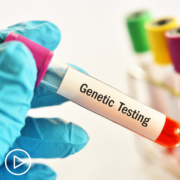
|
Transcript:
Katherine:
Dr. Abraham, for breast cancer patients who don’t understand the term, what is genomic testing?
Dr. Abraham:
So, genomic testing, there are two types of genomic testing, what we call as, germline testing. And then, there’s another one, what we call as, somatic testing. So, germline testing means, the question is, if I carry a gene which can make me high risk for breast cancer. So, one of the most common questions I get from our patients when I see them is, “Oh, do I carry a gene? Why did I get this breast cancer?” And then, the other question is, “What’s the risk for my kids, my daughter?”
So, I’ve seen, about 5 to 10 percent of breast cancers are due to an abnormal gene. To find that, we do, what we call as, the germline testing. That’s the first – when we say genomic testing, that’s the most commonly understood nomenclature.
So, do I carry this gene? It’s a blood test, or we can take a mouth swab. That will give us an answer, if that person carries a gene.
Usually, we test several genes, and I’m sure, most of the people have BRCA1, BRCA2, PALB2, CDH1. Those are some of the genes we test, and BRCA1 and BRCA2 are the most common, and 80 percent of heredity, or those who are transmitted to the next generation, is attributed to BRCA1 and BRCA2.
Katherine:
How is this testing administered?
Dr. Abraham:
So, it’s a blood test.
Most of the time, we can draw – usually, the way we do is, I like to say, if I’m seeing a patient who has – and this is a patient who’s 45 years old and has a strong family history, or in patients under the age of 50, with a triple-negative breast cancer, or any person under the age of 50, can be considered for genetic counseling. And then, based upon the conversation with a genetic counselor, we will recommend the genetic testing. Usually, it’s a blood draw.
What Is Precision Oncology and What Does It Mean for Breast Cancer Patients?
What Is Precision Oncology and What Does It Mean for Breast Cancer Patients? from Patient Empowerment Network on Vimeo.
Are we closer to personalizing breast cancer treatment? Dr. Bhuvaneswari Ramaswamy defines precision oncology and explains the progress being made to make it a reality.
Dr. Bhuvaneswari Ramaswamy is the Section Chief of Breast Medical Oncology and the Director of the Medical Oncology Fellowship Program in Breast Cancer at The Ohio State College of Medicine. Learn more about Dr. Ramaswamy.
See More From INSIST! Metastatic Breast Cancer
Related Resources:
Transcript:
Katherine:
We often hear the term precision oncology. What exactly does that mean?
Dr. Ramaswamy:
So, precision oncology is again, one of the ways that we are getting better, right? So, what we are trying to understand is that originally, we just understood cancer as just where all it is and how spread it is. Again, an anatomical. Now we are getting more and more into the biology. So, in the biology we were focusing more on the RNA. There are two things, the RNA and DNA. DNA is your code, and RNA is the one that comes from the DNA kind of the message that goes, makes the protein, which changes everything in your body. So, we were focusing on the RNA, which are the biomarkers, right? Because we – you that that’s what drives the cancer. Now we are focusing more on the DNA. What is changing within the core, that blueprint in the tumors that is causing resistance that is making cancer cells worse?
Could we target those? And so that is what is precision oncology. They’re trying to understand the genetic core change within your tumor and maybe able to target that. You could have breast cancer, you could have a completely different cancer like lung cancer. But if you have the same genomic change or gene change within the tumor, could we just target that cells and be able to get a really good response? And those are the kind of ways we are going towards. And I can tell you it is as you hear this concept, it sounds like so bizarre. I’ll tell you, I felt the same too when it all started, even as a scientist and an oncologist. But it is truly becoming a reality. And in certainly in more some cancers more than the others, but it’s slowly becoming a reality for all cancers. So definitely, again, a positive and a tailored therapy to the patient. And so that’s what we want.
How Do Biomarker Test Results Impact a Breast Cancer Patient’s Prognosis?
How Do Biomarker Test Results Impact a Breast Cancer Patient’s Prognosis? from Patient Empowerment Network on Vimeo.
What role do biomarker test results play in a breast cancer patient’s prognosis? Dr. Bhuvaneswari Ramaswamy reviews important biomarkers, such as hormone receptor status, and how they affect care.
See More From INSIST! Metastatic Breast Cancer
Related Resources:

What Do You Need to Know About Breast Cancer Genetic Testing? |

|
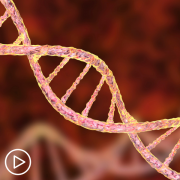
How Do Genetic Mutations Impact Breast Cancer Risk, Prognosis, and Treatment? |
Transcript:
Katherine:
How do biomarker test results impact prognosis?
Dr. Ramaswamy:
All of them do because it’s important to understand that that’s why this – these biomarkers carry a lot of weight. Biomarkers are good, are important, but when the most important biomarkers are that are going to impact outcomes. And then even more important is whether they’re going to predict the efficacy of a treatment, the outcomes used by the success of a treatment, right?
So, in that way, if your tumor is estrogen and progesterone receptor- positive, then you generally tend to do a little bit better. And they are slightly better tumors for sure, and you know that the anti-estrogens would work. So, these – there’s two ways. They are prognostic and predictive. Now, the whole two positive tumors previously used to have a worse prognosis, but we have such wonderful anti HER2 therapies now that we can use. Now we know that if you use those therapies, the outcomes are better.
So, it’s predictive again, that predictive of the treatment and prognostic. Now the triple negatives are usually a little bit more difficult to treat because as you can understand, they don’t have any of these targets for us to use targeted therapy at this point. There is definitely some improved outcomes using immunotherapy, but you know that we don’t have those proteins. So, slightly worse outcomes for sure, triple negative among all of these subtypes. And also there is no biomarkers.
We do use immunotherapy, which is helping certain percentage of those patients, but we still need to understand why it’s not helping other people. So, yeah.
Genetic Testing VS Biomarker Testing: What’s the Difference?
Genetic Testing VS Biomarker Testing: What’s the Difference? from Patient Empowerment Network on Vimeo.
See More From INSIST! Metastatic Breast Cancer
Related Resources:

What Do You Need to Know About Breast Cancer Genetic Testing? |

|

|
Transcript:
Katherine:
Patients are often confused about the difference between hereditary genetic testing and biomarker testing. Would you explain the difference?
Dr. Ramaswamy:
Absolutely. So, the hereditary genetic testing is what are the genes that you got from your parents? It could be mother or father. And we all think that because it’s breast cancer should be just from mother. It doesn’t matter. It can be from mom or dad. And that influences your breast cancer risk. So, if you have some mutations or some changes in certain genes that can increase your risk of breast cancer. And the well-known ones are the BRCA1, BRCA2, but we also now know a few more like the PALB, ATM and CHEK2 and other things.
So, now when you do have a family history, or sometimes even based on your age and your oral history, we do test for this hereditary risk factors that you might have and that may influence your surgery and some type of treatments that we give as well.
Now as far as biomarkers, biomarkers are more proteins that we check in your tumors. The breast cancer that you already have, and that we may do the biopsies. We look for these tumor proteins that influences the growth of your cancer cells. So, we can target these biomarkers and decrease the growth of your cancer cells.
What Do You Need to Know About Metastatic Breast Cancer Genetic Testing?
What Do You Need to Know About Metastatic Breast Cancer Genetic Testing? from Patient Empowerment Network on Vimeo.
Why is it important to ask about metastatic breast cancer genetic testing? Find out how test results could reveal more about YOUR breast cancer and could help determine the most effective treatment approach.
See More From INSIST! Metastatic Breast Cancer
Related Resources:
Transcript:
Why should you ask your doctor about metastatic breast cancer genetic testing?
The National Comprehensive Cancer Network – also known as the NCCN – recommends that every metastatic breast cancer patient undergo genetic testing. The test results can help predict how your cancer may behave and could indicate that one type of treatment is more effective than another.
This testing identifies specific gene mutations, proteins, chromosomal abnormalities, and/or other molecular changes that are unique to YOU and YOUR breast cancer.
There are two main types of genetic tests used in breast cancer:
- Germline or hereditary genetic testing, which identifies inherited gene mutations in the body. These mutations are present from birth, can be shared among family members and be passed on to subsequent generations.
- The second is somatic or tumor genetic testing, which identifies markers that are unique to the cancer itself. It is also commonly referred to as genomic testing, biomarker testing, or molecular profiling. Somatic mutations are NOT inherited or passed down from family member to family member.
- Depending on your history, your doctor may order one–or both–of these types of tests.
So why do the test results matter?
- If you have specific gene mutations – such as the BRCA1 or BRCA2 inherited gene mutations – it could indicate that a targeted treatment approach may be the most effective option. For example, there are two oral targeted therapies that are approved specifically for use in metastatic patients with BRCA1-positive or BRCA2-positive breast cancer.
- Results of these tests may also help you to find a clinical trial that may be appropriate for your particular cancer.
- Additionally, results from germline genetic testing may suggest that close family members should also be tested to determine their risk.
How can you insist on the best breast cancer care?
- First, always speak up and ask questions. Remember, you have a voice in YOUR breast cancer care.
- Ask your doctor if you have had–or will receive–genetic testing, including germline and somatic testing.
- If you have already undergone genetic testing, bring a copy of your results to your current doctor, so they can understand your results and determine whether additional testing is needed.
- Have a discussion with your healthcare team about the test results – including which markers were detected and how results may impact your care and treatment plan.
- Ask whether your family members should meet with a genetic counselor or undergo testing to help gauge their risk of developing breast cancer.
- And, finally, bring a friend or a loved one to your appointments to help you process and recall information.
To learn more about breast cancer and to access tools for self-advocacy, visit powerfulpatients.org/breastcancer.
What Questions Should Metastatic Breast Cancer Patients Ask Before Starting a Treatment Plan?
What Questions Should Metastatic Breast Cancer Patients Ask Before Starting a Treatment Plan? from Patient Empowerment Network on Vimeo.
Before metastatic breast cancer treatment begins, it’s important to speak up and ask questions. Expert Dr. Sarah Sammons shares key questions patients should ask to ensure a personalized approach to their care and treatment.
Dr. Sarah Sammons is an oncologist at Duke Cancer Institute and Assistant Professor of Medicine at Duke University School of Medicine. Learn more about Dr. Sammons here.
See More From INSIST! Metastatic Breast Cancer
Related Resources:

Which Metastatic Breast Cancer Treatment Is Right for You? Guide |

|

Key Considerations When Making Metastatic Breast Cancer Treatment Decisions |
Transcript:
Katherine:
What key questions do you think patients should ask about their proposed treatment plan, to make sure they’re getting the most personalized approach for their disease?
Dr. Sammons:
That’s a great question. So, first and foremost – when you get an initial diagnosis of metastatic breast cancer, it can be nearly debilitating mentally at first, so it’s a little bit hard to be an advocate for yourself.
But it is so important, eventually, to become an advocate for yourself and the first thing that I would say is it’s very important that you have had a biopsy of a metastatic site. So, if something shows up on a scan that looks abnormal – maybe a liver legion or a lung legion – it’s very important that that area is biopsied and checked again for estrogen, progesterone, and HER2. And the reason for that is – there’s a phenomenon called subtype switching. So, a patient can – maybe her early-stage breast cancer was estrogen receptor-positive. There’s a 15 to 20 percent chance that her metastatic disease could be estrogen-negative, and it’s critical that we know what the estrogen and the HER2 are, so that we can treat them with the initial best treatments.
So, that’s number one. I think it’s very important to have a biopsy of your metastatic site, to repeat that estrogen and HER2.
Next, pretty important to have had at least germline BRCA testing. And the reason for that is: We now have drugs, the PARP inhibitors that I talked about before, that specifically benefit patients that have a BRCA mutation.
And then, the next would be – is there a role for next generation sequencing, which is the somatic gene testing of the patient’s tumor.
I would say practice patterns differ. For HER2-positive breast cancer, it’s probably not important to have that upfront because we have a very – it’s critical that we know that you’re HER2-
positive, so that we can give you those best HER2 targeted therapies in the first few lines. But we’re really not going to use that genomic sequencing information for really the first couple of years in metastatic, HER2-positive breast cancer.
For hormone receptor-positive breast cancer, I do think it’s pretty important to know what your genomic testing is – your next generation sequencing is – upfront. If you have an ESR1 mutation, then we know that you’re resistant to certain types of endocrine therapy, and we would not give you them. If you have a PI3-Kinase, then we would give you that if you qualified, otherwise we would give you that drug that targeted the PI3-Kinase mutation probably in the second line.
So, next generation sequencing is pretty important, either in first or second line, in hormone receptor-positive breast cancer.
Triple-negative breast cancer – the most important thing upfront is to know what your PDL1 status is. And it’s very important that if you’re PDL1-positive, you get immunotherapy with your first treatment because we know that immunotherapy, if you get it in later lines of treatment, does not work as well as if you get it in the first line.
So, it’s always really tough for patients to wait a couple weeks to get started on treatment, but as long as your disease is not growing so rapidly that your physician is concerned, which is on the rare end, it’s good to get all your ducks in a row, get all of the information that you need, so that you can be started on the best treatment.
Katherine:
Dr. Sammons, why should patients feel like they should speak up and that they have a voice?
Dr. Sammons:
Patients should feel like they should speak up and have a voice because this is their life. This is your life. This is your treatment. This is – nobody is going to advocate for you as well as yourself. If you’re lucky, you’ll find a physician that is an advocate, and many of us are, but nobody will advocate for you as well as you will advocate for yourself. So, that’s reason number one.
And reason number two would be: we’re all humans. Your doctors are humans. Some physicians, especially physicians in the community, may not only treat breast cancer. They may treat every single type of cancer, and it’s very hard to stay specifically on top of all of the new drugs and new options coming out in every tumor type; it’s virtually impossible.
So, I just think it’s important to be an advocate. Never be afraid to ask a question. Most physicians should not feel threatened by that. We like a patient to be engaged. So, never worry or be fearful about that.
An Expert Review of Emerging Metastatic Breast Cancer Research
An Expert Review of Emerging Metastatic Breast Cancer Research from Patient Empowerment Network on Vimeo.
What’s the latest in metastatic breast cancer (MBC) research? Expert Dr. Sarah Sammons shares an overview of emerging treatment options and how they could be utilized in MBC care.
Dr. Sarah Sammons is an oncologist at Duke Cancer Institute and Assistant Professor of Medicine at Duke University School of Medicine. Learn more about Dr. Sammons here.
See More From INSIST! Metastatic Breast Cancer
Related Resources:
Transcript:
Katherine:
When it comes to metastatic breast cancer research and emerging treatment options, what are you excited about specifically?
Dr. Sammons:
That’s a really good question. I think, right now, I’m very interested in a class of drugs called antibody drug conjugates.
What antibody drug conjugates are – they take a monoclonal antibody, which is – most patients have heard of Herceptin. So, Herceptin is an antibody which goes in and targets HER2. But that antibody is actually linked to a payload of chemotherapy cells. But instead of just – regular chemotherapy we inject that chemotherapy into the veins, it goes all throughout the body, it can be fairly toxic.
Antibody drug conjugates specifically find the cells that have that biomarker, like HER2, or TROP2, or HER3, and they find that cell, and they don’t release their chemotherapy until they’re taken up by that cell. So, it’s more a targeted, focused chemotherapy.
There is an antibody drug conjugate in HER2-positive breast cancer called Enhertu, or trastuzumab deruxtecan, which is – has been shown to have excellent efficacy in very heavily pre-treated HER2-postitive breast cancer.
It’s moving into earlier lines of therapy. The drug is so effective in HER2-positive breast cancer, we’re also looking at it in something called HER2-low breast cancer. So, breast cancers that we never thought before would respond to HER2 targeted therapy is – it appears that even if they express a little of HER2, this drug might have efficacy. So, that’s in clinical trials, and that’s really exciting.
What’s also great, is about 60 percent of women with hormone receptor-positive breast cancer are HER2-low. So, that could be a really great drug option in the future for those patients.
There’s another antibody drug conjugate called sacituzumab govitecan, which is approved in triple-negative breast cancer, and was shown to improve overall survival, which you always want at the end of the day – a drug that is well-tolerated and helps patients live longer.
That drug is approved in triple-negative breast cancer, but we’re now looking at it in hormone receptor-positive breast cancer.
There are also a variety of other antibody drug conjugates in clinical trials. One that’s looking at HER3, a few others that are looking at HER2, and also TROP2.
So, I’m definitely excited about antibody drug conjugates.
I’m also very excited about the field of immunotherapy in general. Immunotherapy has sort of lagged behind in breast cancer compared to some other tumor types like lung cancer and melanoma. But in triple-negative breast cancer, we finally have approval for two types of immunotherapy, but only if they have a certain biomarker.
Right now, immunotherapy only helps patients with metastatic triple-negative breast cancer if they express something called PDL1. So, we have FDA approval for two different immunotherapies for PDL1-positive triple-negative breast cancer. And there are many different strategies ongoing in clinical trials with different types of immunotherapy that try to harness the patient’s immune system to fight the cancer, instead of just giving regular chemotherapy. It’s really trying to help the patient’s immune response help fight the cancer.
What Do Metastatic Breast Cancer Patients Need to Know About Genetic Testing?
What Do Metastatic Breast Cancer Patients Need to Know About Genetic Testing? from Patient Empowerment Network on Vimeo.
What do metastatic breast cancer patients need to learn about genetic testing? Expert Dr. Sarah Sammons explains the difference between germline testing versus somatic testing and defines key terms, including biomarker testing and genetic mutations.
Dr. Sarah Sammons is an oncologist at Duke Cancer Institute and Assistant Professor of Medicine at Duke University School of Medicine. Learn more about Dr. Sammons here.
See More From INSIST! Metastatic Breast Cancer
Related Resources:

|

Essential Testing Following a Metastatic Breast Cancer Diagnosis |

How Do Genetic Mutations Impact Breast Cancer Risk, Prognosis and Treatment? |
Transcript:
Katherine:
Many patients are confused by genetic testing. Let’s look at the difference between germline and somatic testing.
Dr. Sammons:
Yes, that’s a really good question and one that comes up in the clinic quite frequently. When I tell a patient that I want to get some sort of genetic testing, they often are confused, and say, “Well, I’ve already had genetic testing, maybe when I was first diagnosed with early-stage breast cancer.” And so then, I do often times need to explain what the difference between germline and somatic genetic testing is.
So, germline testing is testing that’s done on cells in your body that actually don’t have cancer. And the purpose of germline testing, which we often do in early-state breast cancer or in metastatic breast cancer, is to understand if you have inherited genes that could pre-dispose you to developing breast cancer. But also, in the metastatic setting, it’s important to do germline testing because we do have drugs that are approved for patients that have germline mutations in the BRCA genes. And research is evolving, but there are other germline genes of interest that could be biomarkers for other therapies.
Somatic testing is basically genetic testing on the breast cancer cells themselves. So, most often we will get a biopsy, usually of a metastatic area, like the liver, or bone, or lung. Really the safest, most accessible place. If we’re able to safely get a biopsy, oftentimes we’ll send somatic testing – that’s also referred to as usually next generation sequencing – is all somatic testing. And that tests mutations that have developed in the breast cancer itself. It could potentially be biomarkers for optimizing and tailoring personalized treatment approaches to the patient’s cancer.
Katherine:
I’d like to define a few terms. First of all, what is biomarker testing?
Dr. Sammons:
That’s a really good question. So, a biomarker is really anything – it could be a gene; it could be a protein – that is expressed on a patient’s cancer, that makes them a good candidate for a certain drug, essentially.
So, one of the earliest biomarkers that we’ve had in breast cancer – and still, I would argue, the most important biomarkers – are estrogen receptor and HER2.
Now, we test all breast cancers for estrogen receptor and HER2 because we know for estrogen receptor – if a patient has estrogen receptor high positivity at their initial diagnosis, that is the best biomarker for endocrine therapies, whereas HER2 present on a breast cancer cell – patients that overexpress HER2, they are great candidates for drugs that specifically target HER2.
So, it simply means that we found something on their breast cancer cell that makes them a good candidate for a treatment.
Katherine:
What is a genetic mutation?
Dr. Sammons:
So, genetic mutations are a permanent change in the DNA of a gene, in either a cancer cell or a cell that somebody was born with. So, it’s a change in the DNA sequence. And some gene mutations drive cancers to grow. Some mutations do not drive cancers to grow. Generally, in the treatment of all advanced cancers, we only target with drugs those gene mutations that we know are what we call “driver mutations.” So, mutations that actually cause the cancer to grow.
How Can You Ensure You’ve Had Essential Metastatic Breast Cancer Testing?
How Can You Ensure You’ve Had Essential Metastatic Breast Cancer Testing? from Patient Empowerment Network on Vimeo.
How can metastatic breast cancer patient ensure they receive essential testing? Dr. Jane Lowe Meisel explains how tests can vary by patient and shares advice for key questions to ask to help ensure optimal care.
Jane Lowe Meisel, MD is an Associate Professor of Hematology and Medical Oncology at Winship Cancer Institute at Emory University. Learn more about Dr. Meisel here.
See More From INSIST! Metastatic Breast Cancer
Related Resources:
Transcript:
Katherine:
We’ve talked about several key tests. Some patients may be confused about whether they’ve received these tests. So, what questions should they ask their physician to make sure they’re getting appropriate testing?
Dr. Meisel:
I think it’s probably useful because not everybody needs every test, and I think there are often things you hear about online or from friends or even in a webinar like this and there may be a good reason why you haven’t had that particular test. So, I wouldn’t assume that if you haven’t had everything that we’ve talked about today even, that someone’s made a mistake or that you need that and aren’t getting it. But I would ask. I think it’s always helpful to know more, knowledge is power. And so, if you have never had a CT scan or a CA27-29 level or a genomic testing.
I think it’s not a bad thing if you’re curious about it, to just ask your treating team, “Hey, I heard about genomic testing, is there a reason I haven’t had that? Or have I had that?” Maybe you have, and they called it something else. I think it is complicated, but I think it helps to understand what you’ve had done and what you haven’t had done. And sometimes, asking about something like that may prompt the team to do things that my benefit you.
Is Your Metastatic Breast Cancer Treatment Effective?
Is Your Metastatic Breast Cancer Treatment Effective? from Patient Empowerment Network on Vimeo.
How can metastatic breast cancer treatment effectiveness be gauged? Dr. Jane Lowe Meisel shares important indicators, including symptom improvement, and discusses periodic testing that can help track a patient’s treatment results.
Jane Lowe Meisel, MD is an Associate Professor of Hematology and Medical Oncology at Winship Cancer Institute at Emory University. Learn more about Dr. Meisel here.
See More From INSIST! Metastatic Breast Cancer
Related Resources:

|

Factors That Guide a Metastatic Breast Cancer Treatment Decision |

Which Metastatic Breast Cancer Treatment Is Right for You? Guide |
Transcript:
Katherine:
We have another question we received earlier, this one from Eileen. She asks, “How will I know whether my treatment is working?”
Dr. Meisel:
That’s a really good question. So, I think for patients who have symptoms from their cancer, they often will know the drug is working because their symptoms improve. Say if you have lung metastases and you are short of breath and your shortness of breath gets better. That’s a really good sign that the treatment is working. I would say that often what we are doing, and it depends a little bit on the regimen and what the patient is getting and how often they’re coming in.
But we’re checking labs as well and sometimes there are lab abnormalities when a patient is diagnosed with metastatic cancer that can then improve over time. So, for example, if someone has a heavy burden of bone involvement with breast cancer, there’s a lab value called the alkaline phosphatases that will often be elevated. If that starts elevated and comes down, that’s a really good sign. And some of their liver function tests that we check and if a patient has liver metastases, we often will see those come down if a patient is responding.
There are also, what we call tumor markers that we can check in patients with metastatic breast cancer. Those would be proteins in the blood basically that can be made by the breast cancer in abundance. And those are called CA27-29 and CA15.3. Some doctors check both of them. Some will just check one depending on which one their laboratory at their institution is running. But typically, I will check those at diagnosis of metastatic disease. And then if it’s elevated, I know it’s a good marker to follow for my patient. And then I’ll follow that monthly or every three weeks, depending on when the patient is coming in to see me.
And if I see that marker start to go down, it’s not an absolute, but it can be a good early indicator of improvement with the treatment. And then I think it varies a little bit from practice to practice and based on patient preference. But often there will be scans done when a patient is initially diagnosed to determine the extent of the disease. So, usually a CT scan of the chest and the abdomen and the pelvis or a PET scan, which some of you may have heard of. Either one of those is good.
And that can be done about every 12 weeks usually in the beginning, to make sure a patient is responding and once you feel confident that they are, those can be done less frequently. So, I would say the scans and the lab work and then the patient’s overall condition are usually the way that we look to see, are we having a response or not.


